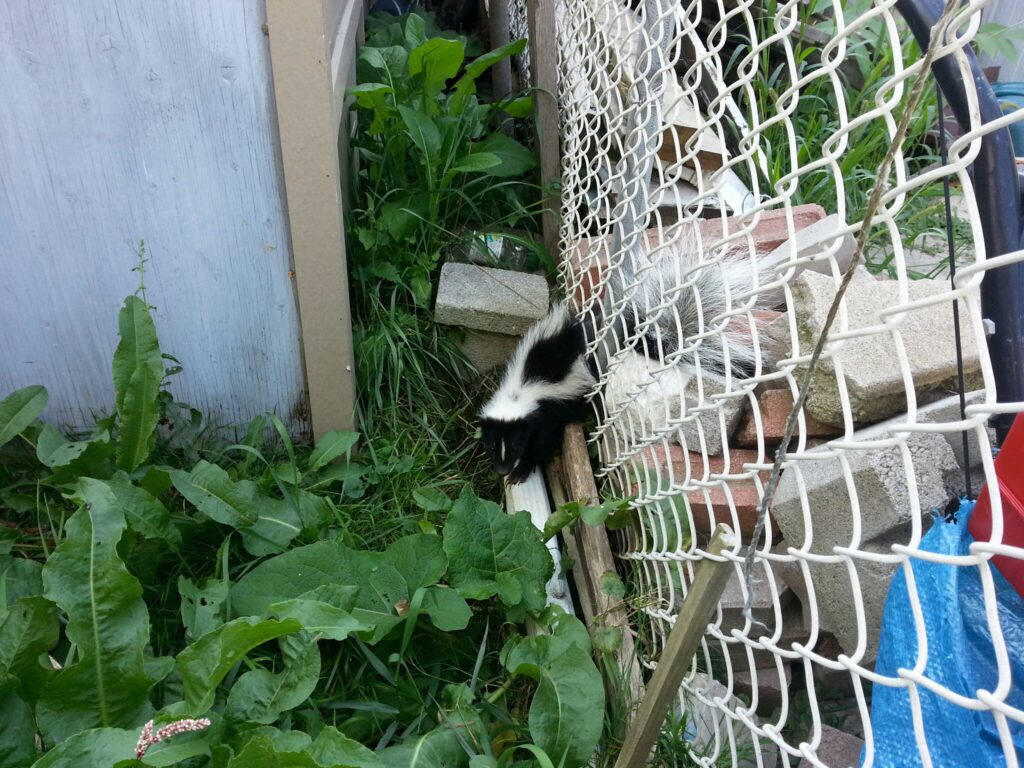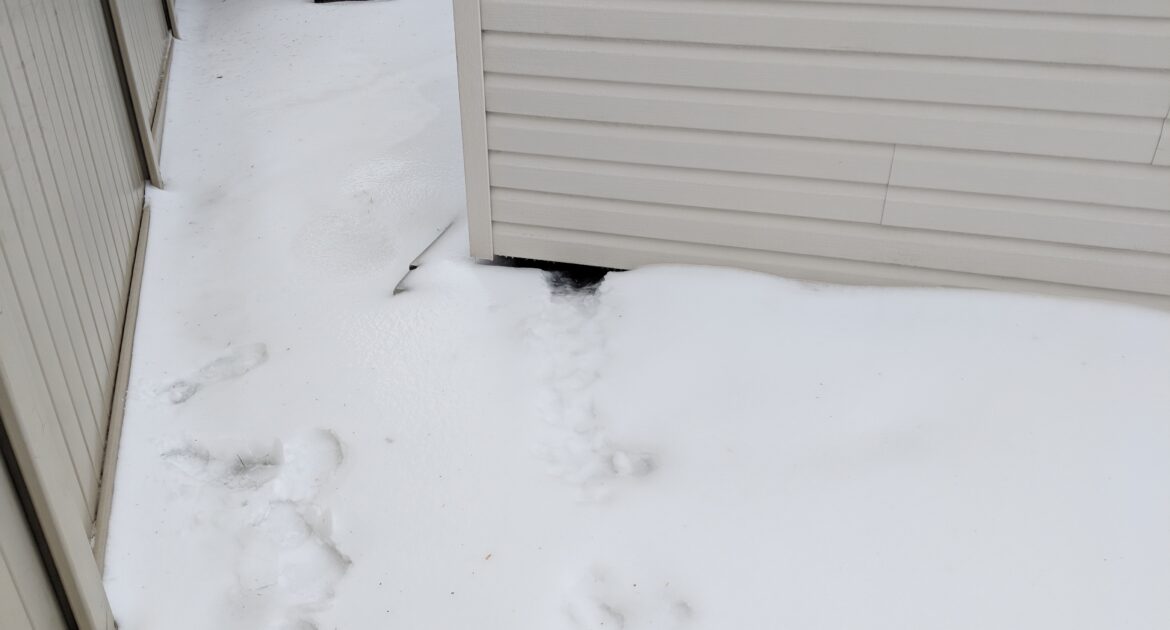Winter can bring a host of unexpected visitors to your Durham home or business, and among the most unwelcome could be skunks. Understanding the behaviours, feeding habits, and overall skunk activity during the chilly months is important. Let’s shed some light on whether skunks hibernate, what they eat, and why they might choose your property as their preferred shelter.
Understanding the winter habits of skunks can go a long way in preventing unplanned musky roommates and help you protect your property effectively. Becoming familiar with their behavioural patterns and dietary needs during the winter can act as your first line of defence. Continue on for more information about skunk removal in Durham and how it comes into play when skunks make a home in your house or business.
Do Skunks Hibernate in Durham?
The question of whether skunks hibernate in Durham is a common one among home and business owners. Generally speaking, skunks do not hibernate in the traditional sense, unlike some other mammals such as bears. However, they do enter a state of torpor during the winter, which is a lighter form of hibernation. In this state, skunks lower their body temperature and metabolic rate to conserve energy. But they can still easily become active again if they need to find food or if the weather becomes milder.
Why is this important to know?
Understanding skunk behaviour can help you manage them if they become a nuisance in or around your property. For example, skunks in their torpor state may seek shelter in homes or businesses to stay warm, using basements, garages, or other sheltered spaces. This can lead to unpleasant odours and potential damage to your property.
What Do Skunks Eat During the Winter?
Ever wondered about the winter diet of skunks? It’s fascinating! During winter, food sources for skunks become increasingly scarce, and their diet shifts considerably. Generally, skunks are omnivores, consuming a well-rounded diet of insects, small rodents, fruits, nuts, and berries during warmer months. But come winter, they have to dig a little deeper to fill their bellies with nourishment.
Skunks take advantage of what’s readily available, which often includes small vegetation, remaining fruits on the ground or tree, and grubs. They may also snack on carrion – the decaying flesh of dead animals – when other food sources are not easily accessible. Skunks are known for their digging habits as they rummage for roots or dormant insects underground. In urban settings, they might even rummage through your trash cans or compost piles, making them a common nuisance and concern for homeowners and businesses in Durham.
This opportunistic behaviour comes from their necessity to store up fat reserves for their long winter respite. The reality of harsh winters and scarce food means skunks have to be flexible and imaginative in their food choices. Why does this matter for you? This need for sustenance can lead them to seek shelter in your homes or businesses as they search for food and warmth, becoming an unwanted guest and presenting a real challenge.
Signs Of Skunk Activity In Your Property
Do you ever wonder if there’s a skunk exploring your property in Durham? Noticing the signs of skunk activity is crucial to managing a potential problem early. Let’s polish up your skunk-detecting skills!
One telltale sign is the distinctive and unpleasant odour skunks release as a defence mechanism – usually when they feel threatened. If you smell that notorious stink around your property, it’s quite possible a skunk has taken up residence somewhere nearby.
Another clue might be small holes and areas of disturbed soil in your lawn or flower beds. Skunks are foragers who tend to dig in search of grubs, their preferred winter food, and other small underground creatures. Visible tracks can also indicate a skunk prowling your property – they look like little handprints with five toes each.
Lastly, skunks are nocturnal animals. So, you may hear noise at night from them moving about or scurrying under decks, in crawlspaces, or even breaking into basements looking for a cozy spot to spend the winter months.
Should you detect any signs of skunk activity around your property, it’s important to react swiftly, yet humanely. That’s where the professionals at Skedaddle Humane Wildlife Control come in. We have the experience and knowledge to safely and ethically remove these creatures from your property, employing techniques that best respect wildlife and property owners alike.
Why Do Skunks Seek Shelter in Homes and Businesses?
Ever wondered why skunks seek shelter in homes and businesses in Durham? The main reason is the changing weather. Like us, skunks seek a warm and secure place to nest during the cold winter. While they do not hibernate, their activity significantly decreases as temperatures drop, leading them to look for comfortable hiding spots. The warmth and seclusion offered by your basement, attic, or local businesses tend to be enticing to these critters.
Skunks are also lured to residential and commercial areas because of our waste. There is often plenty of nutritional scavenging to be completed in garbage bins just outside our doors. This is especially true during the winter when natural food sources are scarce. So, in essence, our homes and businesses present skunks with a one-stop shop for food and shelter.
How To Get Rid Of Skunks: Preventing Skunk Infestations in Winter
Guarding your property against skunk infestations during the winter can be a balancing act. Your goal is to make the place unattractive to these creatures while also keeping it a warm and welcoming space for humans. Here’s how you can strike that balance and deter skunks.
Firstly, it’s crucial to secure all potential food sources. This includes tightly sealing garbage cans and not leaving pet food outdoors. Remember that skunks have a strong and adaptable diet, making them less fussy and more efficient in finding food sources, especially during the winter.
Next, ‘wildlife-proof’ your home or business to make it challenging for skunks to access. Sealing crawl spaces, patching holes in your buildings’ foundations, and securing vents can all thwart a skunk from seeking shelter. This also applies to outbuildings such as sheds and garages.
Lastly, consider your landscaping. Tall grasses, wood piles, and heavy underbrush provide perfect cover for skunks – try to clear these areas, if possible. Fencing, particularly if it’s buried underground to a depth of 1 to 2 feet, can also serve as a proactive deterrent. However, bear in mind that skunks are excellent climbers, so ensure your fence is robust enough and installed correctly.
If, despite your best efforts, you find yourself dealing with a skunky issue this winter, don’t despair. Skedaddle Humane Wildlife Control specializes in safely and humanely removing skunks from homes and businesses.

How Skedaddle Humane Wildlife Control Can Safely Remove Skunks
Skedaddle Humane Wildlife Control is a name you can rely upon when it’s about dealing with wild skunks on your property. Grounded in our commitment to humane practices, we ensure these pesky critters are displaced without causing them any harm. Our team specializes in identifying and safely removing skunks that have decided to make your home or business their winter abode.
First, we perform a thorough assessment to identify signs of skunk activity. This includes locating entry points and determining the extent of the infestation. Once skunks are located, our Skedaddle professionals use state-of-the-art techniques to extract them safely. Our team is trained to handle skunks appropriately, reducing the risk of spraying – something anyone dealing with skunks would want to avoid.
But our role doesn’t just end at removing skunks from your property. We also ensure all entry points are secured to prevent future skunk infestations. Our team will follow this up with expert advice on property maintenance to keep skunks at bay.
Engaging Skedaddle Humane Wildlife Control offers you a comprehensive solution for skunk troubles during winter. Not only do we ensure a skunk-free space, but we will also equip you with the knowledge to keep it that way.
Contact us today for more information about wildlife removal in Durham.



